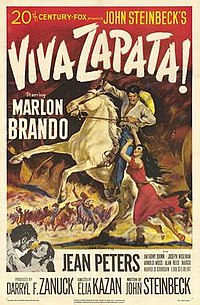Viva Zapata!
by John Steinbeck
Emiliano Zapata (Brando) is part of a delegation sent to complain about injustices to corrupt longtime President Porfirio Díaz (Fay Roope), but Díaz dismisses their concerns, driving Zapata to open rebellion, along with his brother Eufemio (Quinn). He in the south and Pancho Villa (Alan Reed) in the north unite under the leadership of naive reformer Francisco Madero (Harold Gordon).
Díaz is finally toppled and Madero takes his place, but Zapata is dismayed to find that nothing is changing. Madero offers Zapata land of his own while failing to take action to distribute land to the campesinos who fought to end the dictatorship and break up the estates of the elites. Zapata rejects the offer and seeks no personal gain. Meanwhile, the ineffectual but well-meaning Madero puts his trust in treacherous General Victoriano Huerta (Frank Silvera). Huerta first takes Madero captive and then has him murdered.
Steinbeck meditates in the film on the tempting military force and political might, which corrupts men. As it becomes clear that each new regime is no less corrupt and self-serving than the one it replaced, Zapata remains guided by his desire to return the peasants their recently robbed lands, while forsaking his personal interests. His own brother sets himself up as a petty dictator, taking what he wants without regard for the law, but Zapata remains a rebel leader of high integrity. Although he is able to defeat Huerta after Madero's assassination, as a result of his integrity, Zapata loses his brother, and his position.
Although in the end Zapata himself is lured into an ambush and killed, the film suggests that the resistance of the campesinos does not end. Rumors begin that Zapata never died, but is instead continuing to fight from the hills, feeding the campesinos a sense of hope. As several scenes suggest, over the years, the campesinos have learned to lead themselves rather than look to others to lead them.
